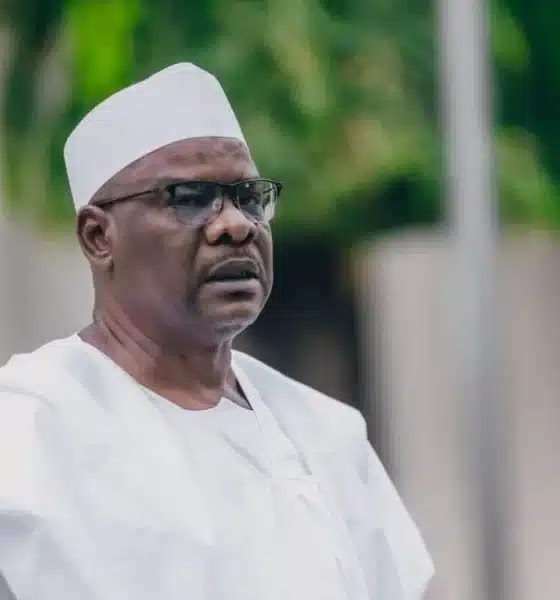On September 7, 2025, the volatile security situation in Nigeria’s Northeast took a grim turn as Boko Haram insurgents launched a deadly attack in Borno State, resulting in the tragic loss of several security personnel and civilians. The assault, which targeted a military outpost and surrounding communities, has sparked widespread outrage and renewed calls for decisive action against the persistent threat of terrorism in the region. Senator Ali Ndume, a prominent figure representing Borno South in the Nigerian Senate, has strongly condemned the attack, describing it as a brutal reminder of the ongoing challenges in combating insurgency in Nigeria’s Northeast. In a statement issued shortly after the incident, Ndume expressed deep sorrow over the loss of lives and urged the federal government and security agencies to intensify efforts to protect vulnerable communities and restore peace in the region.
Details of the Attack
The attack occurred in a remote area of Borno State, a region that has been at the epicenter of Boko Haram’s insurgency for over a decade. According to security sources, the insurgents, armed with sophisticated weapons, stormed a military outpost in the early hours of the day, catching the stationed troops off guard. The assailants reportedly overwhelmed the security forces, leading to a fierce gunfight that lasted several hours. In addition to targeting the military, the insurgents also attacked nearby civilian settlements, burning homes, looting properties, and causing widespread panic among residents.
Preliminary reports indicate that at least a dozen security personnel, including soldiers and members of the Civilian Joint Task Force (CJTF), were killed in the ambush. Several civilians, including women and children, also lost their lives, while others sustained injuries or were displaced as they fled into the surrounding bush for safety. The exact casualty figures remain uncertain, as authorities are still assessing the full extent of the damage. The attack has been described as one of the deadliest in recent months, underscoring the persistent threat posed by Boko Haram despite years of military operations aimed at dismantling the group.
The targeted area, though not explicitly named in initial reports, is believed to be within the Gwoza Local Government Area, a known hotspot for insurgent activities. Gwoza has been repeatedly attacked by Boko Haram and its splinter faction, the Islamic State West Africa Province (ISWAP), due to its strategic location near the border with Cameroon and its proximity to the Mandara Mountains, which serve as a hideout for insurgents. The rugged terrain and limited infrastructure in the region have made it challenging for security forces to maintain a consistent presence, allowing insurgents to exploit these vulnerabilities to launch surprise attacks.
Senator Ndume’s Reaction
Senator Ali Ndume, a vocal advocate for the people of Borno State and a long-standing critic of the government’s handling of the insurgency, expressed profound grief over the incident. In a press statement released to journalists in Maiduguri, the state capital, Ndume described the attack as “heartbreaking” and “unacceptable,” emphasizing the need for a reevaluation of Nigeria’s counterterrorism strategy. “The killing of our gallant security officers and innocent civilians by these bloodthirsty terrorists is a painful reminder that the war against Boko Haram is far from over,” Ndume said. “These are our brothers, sisters, and children who are being slaughtered. We cannot continue to live like this.”
Ndume, who has represented Borno South in the Senate since 2011, called on the federal government to provide better equipment, training, and welfare for security personnel deployed to the Northeast. He argued that the military’s efforts have been hampered by inadequate resources, poor intelligence gathering, and a lack of coordination among security agencies. “Our soldiers are doing their best, but they are overstretched and under-equipped. We cannot expect them to win this war with outdated weapons and insufficient support,” he stated. The senator also urged the government to prioritize the welfare of soldiers’ families, noting that many fallen heroes leave behind dependents who struggle to survive.
In addition to addressing the military’s challenges, Ndume appealed for increased support for displaced communities in Borno State. He highlighted the plight of thousands of residents who have been forced to flee their homes due to repeated attacks, many of whom are now living in overcrowded internally displaced persons (IDP) camps with limited access to food, water, and healthcare. “The people of Borno have suffered enough,” Ndume said. “We must do more to protect our communities and ensure that those who have been displaced can return to their homes with dignity.”
Historical Context of Boko Haram’s Insurgency
To fully understand the significance of the recent attack and Senator Ndume’s reaction, it is essential to examine the broader context of Boko Haram’s insurgency in Nigeria. Boko Haram, whose name loosely translates to “Western education is forbidden,” emerged in the early 2000s under the leadership of Mohammed Yusuf. Initially a religious movement advocating for strict Islamic governance, the group radicalized following Yusuf’s death in 2009 during a clash with security forces. Under the leadership of Abubakar Shekau, Boko Haram escalated its campaign of violence, targeting schools, churches, mosques, markets, and government institutions.
The insurgency reached its peak in 2014 when Boko Haram captured large swathes of territory in Borno, Yobe, and Adamawa states, declaring a so-called caliphate. The group’s most infamous act was the abduction of 276 schoolgirls from Chibok in April 2014, an incident that drew global condemnation and sparked the #BringBackOurGirls campaign. Although the Nigerian military, with support from regional allies and international partners, has since reclaimed much of the territory once controlled by Boko Haram, the group remains a formidable threat, particularly in remote areas.
In recent years, the emergence of ISWAP, a faction aligned with the Islamic State, has further complicated the security landscape. ISWAP has adopted a more strategic approach, targeting military installations and engaging in governance-like activities in areas under its control. The rivalry between Boko Haram and ISWAP has led to internal clashes, but both groups continue to pose significant challenges to Nigeria’s security apparatus. The ongoing violence has resulted in over 35,000 deaths and displaced more than 2.5 million people, according to United Nations estimates, making it one of the world’s most protracted humanitarian crises.
Challenges Facing Nigeria’s Counterterrorism Efforts
The recent attack in Borno State highlights several systemic challenges that have hindered Nigeria’s efforts to defeat Boko Haram and ISWAP. One of the most pressing issues is the military’s limited capacity to maintain control over vast and difficult terrain. Borno State, Nigeria’s largest state by landmass, is characterized by dense forests, mountainous regions, and porous borders, which provide insurgents with ample hiding spots and escape routes. The military’s reliance on static outposts, often poorly fortified, has made them vulnerable to ambushes like the one that occurred in Gwoza.
Another critical challenge is the issue of intelligence gathering. Despite efforts to improve coordination among security agencies, gaps in intelligence have allowed insurgents to plan and execute attacks with relative ease. Local communities, which could serve as valuable sources of intelligence, are often reluctant to cooperate with security forces due to fear of reprisals from insurgents or mistrust of the military. Allegations of human rights abuses by security personnel, including extrajudicial killings and arbitrary arrests, have further eroded trust between the military and civilians.
Funding and resource allocation also remain significant obstacles. While the Nigerian government has allocated substantial budgets to defense in recent years, much of the funding is reportedly mismanaged or diverted, resulting in poorly equipped troops and delayed salaries. Senator Ndume’s call for better equipment and welfare for soldiers echoes longstanding criticisms from civil society organizations and security analysts, who argue that addressing these issues is critical to boosting troop morale and effectiveness.
Broader Implications of the Attack
The attack in Borno State has far-reaching implications for Nigeria’s security, economy, and social fabric. From a security perspective, it underscores the need for a comprehensive review of the country’s counterterrorism strategy. The continued ability of Boko Haram and ISWAP to launch deadly attacks suggests that current approaches, which rely heavily on military force, may not be sufficient to address the root causes of the insurgency. Analysts have long advocated for a multifaceted approach that combines military action with efforts to address poverty, unemployment, and lack of education—factors that make young people vulnerable to recruitment by extremist groups.
Economically, the insurgency has devastated the Northeast, once a thriving agricultural region. The destruction of farmlands, markets, and infrastructure has left millions of people dependent on humanitarian aid. The attack in Gwoza, which displaced additional families and disrupted local economies, will likely exacerbate food insecurity in the region, where millions are already facing acute hunger. The World Food Programme has warned that without sustained intervention, the Northeast could face a catastrophic food crisis in the coming years.
Socially, the repeated attacks have deepened mistrust and division among communities. The targeting of civilians, particularly those perceived to be collaborating with the military, has created an atmosphere of fear and suspicion. Women and children, who make up the majority of IDPs, are particularly vulnerable to exploitation and abuse in camps. The psychological toll of the conflict, including trauma and loss, has also left lasting scars on the population.
Calls for Action and the Way Forward
Senator Ndume’s condemnation of the attack has been echoed by other stakeholders, including community leaders, civil society organizations, and international partners. The Borno State government, led by Governor Babagana Zulum, has also expressed condolences to the families of the victims and vowed to work with federal authorities to prevent future attacks. Zulum, who has been praised for his hands-on approach to governance, has repeatedly called for increased federal support to address the security and humanitarian challenges in the state.
At the national level, there is growing pressure on President Bola Tinubu’s administration to take decisive action. Since assuming office in 2023, Tinubu has prioritized security, promising to end the insurgency and other forms of violence plaguing the country. However, critics argue that his administration has yet to deliver on these promises, pointing to the persistence of attacks in the Northeast, Northwest, and other regions. The recent attack in Borno is likely to intensify calls for a more robust and coordinated response.
International partners, including the United States, United Kingdom, and the African Union, have also reiterated their commitment to supporting Nigeria’s counterterrorism efforts. The Multinational Joint Task Force (MNJTF), which includes troops from Nigeria, Chad, Niger, and Cameroon, has been instrumental in conducting cross-border operations against Boko Haram and ISWAP. However, funding constraints and logistical challenges have limited the MNJTF’s effectiveness, prompting calls for increased support from the international community.
Community Resilience and Hope for the Future
Despite the devastating impact of the insurgency, the people of Borno State have shown remarkable resilience. Community-based initiatives, such as the Civilian Joint Task Force, have played a crucial role in supporting military efforts and protecting vulnerable populations. Local leaders and religious figures have also been at the forefront of promoting peace and reconciliation, working to bridge divides and foster unity among communities.
Efforts to rebuild the Northeast are ongoing, with projects aimed at reconstructing schools, hospitals, and infrastructure. The Northeast Development Commission (NEDC), established in 2017, has been tasked with coordinating these efforts, but progress has been slow due to funding shortages and ongoing insecurity. Senator Ndume and other stakeholders have called for greater investment in these initiatives, arguing that sustainable development is key to addressing the root causes of the insurgency.
As Nigeria grapples with the latest tragedy in Borno State, the voices of leaders like Senator Ndume serve as a reminder of the urgent need for action. The attack is not only a loss of lives but also a stark warning that the fight against Boko Haram requires renewed commitment, resources, and collaboration. For the people of Borno, who have endured years of violence and displacement, the hope for peace remains a powerful driving force, even in the face of unimaginable hardship.
Conclusion
The Boko Haram attack in Borno State on September 7, 2025, is a tragic chapter in Nigeria’s ongoing struggle against insurgency. The loss of security personnel and civilians has reignited debates about the effectiveness of the country’s counterterrorism strategy and the need for comprehensive reforms. Senator Ali Ndume’s passionate call for action reflects the frustration and determination of a region that has borne the brunt of violence for far too long. As Nigeria mourns the victims of this latest attack, the path to lasting peace will require not only military might but also a commitment to addressing the socioeconomic factors that fuel extremism. Only through sustained and collective efforts can the nation hope to end the cycle of violence and rebuild the lives of those affected by the insurgency.






